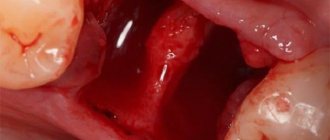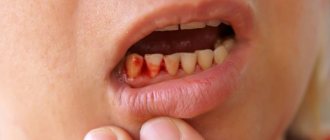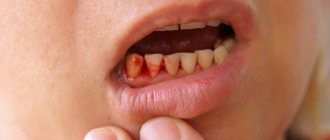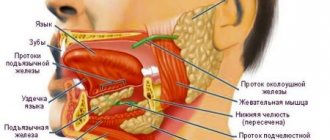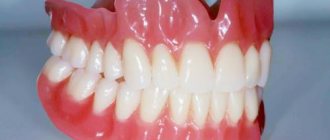Author of the article:
Soldatova Lyudmila Nikolaevna
Candidate of Medical Sciences, Professor of the Department of Clinical Dentistry of the St. Petersburg Medical and Social Institute, Chief Physician of the Alfa-Dent Dental Clinic, St. Petersburg
The taste of blood in the mouth is quite common. However, this symptom should never be ignored. Of course, the reasons for its appearance can be quite harmless, for example, a slight injury to the gums or eating food from clay dishes. However, an unpleasant taste can also indicate very dangerous pathologies. Let's figure out why a metallic taste may appear in the mouth and what to do to eliminate it as soon as possible, and most importantly, remove the reasons for its appearance.
Conventionally, all the causes of a pronounced metallic taste can be divided into three groups:
- Dental problems are usually associated with increased bleeding of the gums.
- Oral injuries.
- Internal pathologies.
Taking various medications often leads to a taste of blood in the mouth.
Oral injuries
If the mucous membrane is damaged, a little blood may enter the taste buds and, accordingly, a metallic taste appears in the mouth.
The causes of mucosal injury may be:
- tartar in the mouth;
- improper dental care, for example, using a brush that is too hard;
- incorrectly installed dentures;
- incorrectly installed braces.
Often the cause of the taste of blood in the mouth is a more significant injury, such as to the esophagus or throat. For example, a strong cough often leads to mucosal injuries. After an injury, a small amount of blood enters the mouth and causes an unpleasant taste.
What causes hemoptysis in cancer?
95% of the blood enters the lungs through the pulmonary arteries, which have low pressure. Having reached the capillary bed, it gives off carbon dioxide and is saturated with oxygen. The remaining part of the blood (5%) reaches the lungs through the bronchial arteries, which have high pressure. It nourishes the respiratory organs and respiratory tract. Hemoptysis is characterized by bleeding from the bronchial arteries. The only exceptions are cases when the pulmonary arteries receive mechanical damage.
Hemoptysis in lung cancer develops against the background of malignant transformation of the epithelium of the respiratory tract. Blood loss is usually minimal. Massive bleeding develops only when the tumor grows into a large artery. This is a dangerous condition that can lead to death due to asphyxia or excessive blood loss.
Internal pathologies
The most common diseases of internal organs that lead to the taste of blood in the mouth include:
- bronchitis;
- pneumonia (pneumonia);
- lung abscess;
- lungs' cancer;
- cystic fibrosis;
- tuberculosis;
- dysfunction of the heart;
- disruption of the gastrointestinal tract (GIT);
- diseases of the ENT organs.
Neurological diseases can also cause the taste of blood in the mouth. A signal travels through the nerve fibers of the brain to the taste buds; if its transmission is disrupted, an unusual taste may appear in the mouth.
However, neurological problems accompanied by a blood taste usually have other unpleasant manifestations. For example, they may be accompanied by headaches, hearing problems, hand tremors, trembling eyelids, and lumbago in certain areas of the face.
In very rare cases, the taste of blood in the mouth is caused by heavy metal poisoning. A similar problem often awaits workers in chemical laboratories and metal processing plants. Intoxication of the body is accompanied by other unpleasant symptoms - attacks of dry cough, nausea, aching limbs, swelling of the gums, and lack of appetite. Dysbacteriosis is also rarely the cause.
Diagnosis and treatment
Determining the cause of the problem in the clinic begins with diagnostic measures. The doctor questions the patient about the symptoms that bother him, collects information about concomitant pathologies and examines the oral cavity.
If damage to internal organs is suspected, the patient is recommended to undergo instrumental examination methods:
- Ultrasound of the abdominal cavity.
- X-rays of light.
If the symptom is associated with dental pathologies, then the following measures will be prescribed to the patient as treatment:
- mouth rinse;
- changing oral care products;
- removal of tartar and plaque.
© pathdoc/Fotolia
If the problem is related to the intake of certain foods, then the patients’ diet is adjusted. More serious causes of pathology are eliminated with the help of medications. The type of drug and its dosage are prescribed by the doctor .
Dental diseases
The most common cause of the taste of blood in the mouth remains dental diseases and lip lesions. Diseases are easily recognized by reddish-colored saliva, inflamed oral mucosa, and the presence of ulcers and erosions.
The main dental problems that cause the taste of blood in the mouth are:
- gingivitis - inflammation of the gums;
- stomatitis - damage to the mucous membranes;
- cheilitis - lip injuries;
- periodontitis is inflammation of the periodontal tissues.
Prevention of hepatosis in pregnant women
Although hepatosis is considered the result of certain genetic characteristics, there are a number of recommendations to avoid it or delay its appearance for a longer period:
- Dieting. If you have a tendency to overload the liver, then you must completely avoid everything fried, fatty, smoked, salty, spicy and sour. The diet should consist of fruits, vegetables (except potatoes, legumes, onions and garlic), low-fat dairy products, chicken breast meat, and low-fat fish. You should not eat chocolate and other cocoa-containing products, egg yolks, cheese, pastries (1-2 pieces of black bread per day are allowed).
- Physical activity. Movement is life, so you need to move more. This speeds up metabolic processes in the body, eliminates congestion, and facilitates the functioning of the liver.
- Refusal of oral hormonal contraceptives and antibacterial agents. They can cause great harm to the liver.
- Take vitamins carefully or avoid them. If possible, you should try to get all the substances the body needs from food, and not from vitamin complexes.
- Treatment of chronic gastrointestinal diseases.
- The use of hepatoprotectors and choleretic drugs. If pregnancy is not planned yet, then it is enough to carry out preventive courses with these drugs, and if pregnancy has already occurred, then they must be taken according to a special schedule agreed with the attending physician.
Hepatosis in pregnant women is a very insidious disease. If you suspect you have signs of it, be sure to tell your doctor so that he can order a blood test and make or rule out a diagnosis.
What to do if you taste blood in your mouth?
First, you should contact your dentist. The doctor will confirm or deny dental diseases, prescribe effective gum treatment or refer you to another specialist.
If the taste of blood in the mouth appears for a short time, you can eliminate it using traditional methods of treatment. For example, rinse your mouth with water and lemon juice or a water-salt solution. You can also get rid of the unpleasant taste using a chamomile solution. To prepare it, you need to pour 5 g of dried flowers into 500 ml of water and cook for 7-10 minutes in an enamel bowl. The product must be infused for an hour.
A decoction of oak bark will also help get rid of the taste of blood in your mouth. To prepare it, 10 grams of raw material should be steamed with boiling water and left for about an hour.
An effective means of treating gum inflammation and eliminating such unpleasant symptoms as the taste of blood in the mouth is ASEPTA Active mouth rinse. This combined action remedy is used for infectious and inflammatory diseases of the oral cavity, and also quickly relieves bleeding and inflammation of the gums. The rinse has an antimicrobial, anti-inflammatory and analgesic effect, does not contain alcohol, fluorine and dyes, so it is perfect for treating even those with the most sensitive tissues.
How to quickly stop bleeding from gums
What to do if you need to quickly stop bleeding from your gums? For this purpose, you can use one of the following methods:
- Rinse your mouth with cold water or mint mouthwash. Decoctions of herbs - chamomile, oak bark, fir, calendula - help reduce the manifestations of unwanted symptoms.
- Apply a cotton swab soaked in chlorhexidine to the bleeding area. You need to press it tightly and wait until the bleeding stops.
- Glue a special protective homeopathic strip. You can buy it at the pharmacy.
No matter how long your gums bleed, you cannot put off a visit to the dentist. The problem will not go away on its own, but will only get worse.
Clinical researches
The effectiveness of various ASEPTA mouth rinses has been repeatedly proven clinically.
For example, it has been clinically proven that the two-component mouth rinse ASEPTA ACTIVE more effectively combats the causes of inflammation and bleeding compared to single-component rinses - it reduces inflammation by 41% and reduces bleeding gums by 43%.
Sources:
- The role of anti-inflammatory rinse in the treatment of periodontal diseases (L.Yu. Orekhova, A.A. Leontyev, S.B. Ulitovsky) L.Yu. OREKHOVA, Doctor of Medical Sciences, Prof., Head of Department; A.A. LEONTIEV, dentist; S.B. ULITOVSKY, Doctor of Medical Sciences, Prof. Department of Therapeutic Dentistry of St. Petersburg State Medical University named after. acad. I. P. Pavlova
- The effectiveness of the use of Asept “adhesive balm” and Asept “gel with propolis” in the treatment of chronic generalized periodontitis and gingivitis in the acute stage (Municipal Dental Clinic No. 4, Bryansk, Kaminskaya T. M. Head of the therapeutic department Kaminskaya Tatyana Mikhailovna MUZ City Dental Clinic No. 4, Bryansk
- The effectiveness of complex therapy in the treatment of periodontal diseases. (Department of Periodontology of the SF State Budgetary Educational Institution of Higher Professional Education MGMSUIM.A.I. Evdokimova. Moscow.) Nemeryuk D.A. - Associate Professor, Candidate of Medical Sciences, Dikinova B.S. - Postgraduate Student of the Department of Periodontology of the SF Tsargasova M.O. - Postgraduate Student of the Department periodontology SF Yashkova V.V. - postgraduate student of the Department of Periodontology of the SF Department of Periodontology of the SF State Budgetary Educational Institution of Higher Professional Education MGMSUIM.A.I.Evdokimova. Moscow
Causes of hepatosis in pregnant women
Doctors turned their attention to this disease relatively recently, so experts are still arguing about what causes its appearance. Most medical minds agree that hepatosis in pregnant women is caused by certain genetic characteristics or disorders and can be transmitted through the female line. These genetic abnormalities may not manifest themselves in any way throughout life. But sometimes pregnancy, which brings with it an increase in body weight, hormonal imbalances and an increased load on the body in general and on the liver in particular, gives impetus to the development of hepatosis. The liver is also very susceptible to the influence of pregnancy hormones. For example, estrogen.
The main factors that increase the risk of this disease include:
- Incorrect intake of vitamins. Vitamins are always an additional burden on the liver. Many vitamin complexes contain increased amounts of various components, which cause liver dysfunction, so they need to be taken correctly, taking into account age, body weight, dosage and stage of pregnancy.
- Dietary disorder. Overeating and eating salty, fried, smoked, fatty foods, as well as foods rich in chemical additives, overload the liver and impair its functioning.
- Insufficient physical activity. If the expectant mother moves little, then little energy obtained from food is consumed, and the metabolism, which is already slowed down by pregnancy, slows down.
Take the first step
make an appointment with a doctor!
